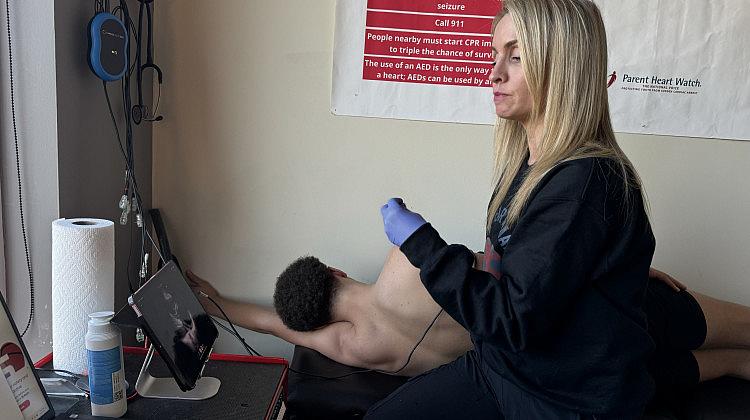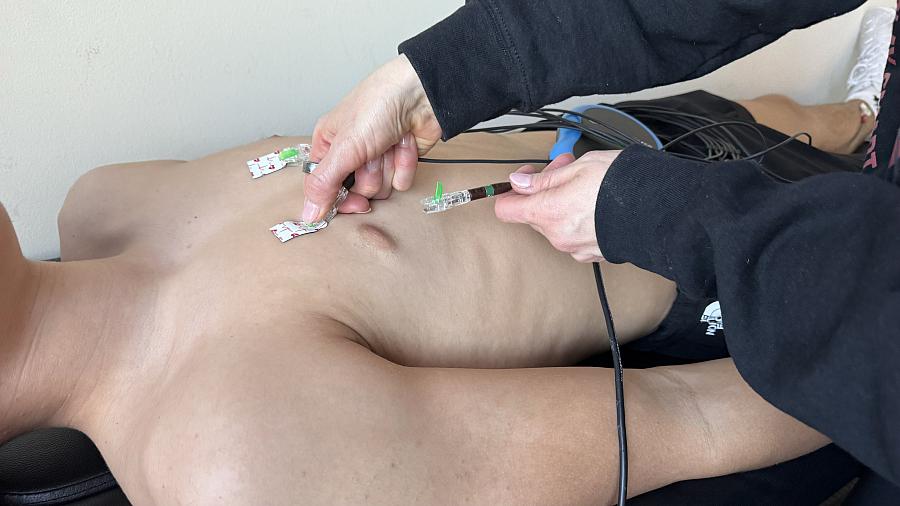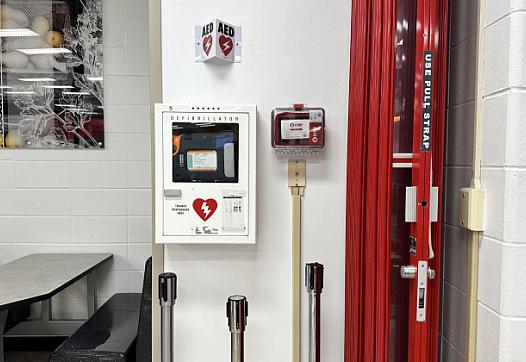Heart screenings for teens can detect abnormalities. But do their benefits outweigh their problems?
The story was originally published by WFYI with support from our 2023 Data Fellowship.

Ashley Williams was inspired to provide heart screenings after Indianapolis, Ind. high schooler John Stewart collapsed during a basketball game in 1999 due to idiopathic hypertrophic cardiomyopathy.
Elizabeth Gabriel / Side Effects Public Media
Teresa Mago describes her son Zac as an honor student, a caretaker for his family and a fierce basketball player.
Zac got heart screenings in South Bend, Ind. in 2014 after his doctor thought he heard a heart murmur. The test showed he was fine. In 2018, the mother and son heard about a teenager dying from sudden cardiac arrest. But they thought Zac was in the clear.
“And ironically, he and I talked about it,” Mago said. “And we're like, ‘So glad we don't have to worry about that with you, because you had had a heart screening.’”
Electrocardiograms (EKG) and echocardiograms (echo) are two key screening tests to monitor a person’s cardiovascular health. An EKG is a machine that maps out the electrical rhythm of the heart to check for any abnormalities, while an echocardiogram is a live-imaging test that doctors use to produce an image of the heart and its valves.
EKGs are 10 times more sensitive than physical exams at capturing heart conditions. But the screening is only a snippet in time. It doesn’t account for when people go in and out of irregular heart rhythms. And they can sometimes incorrectly diagnose people.
Some medical professionals recommend kids get screened annually after detecting a potential heart abnormality. But Teresa said Zac’s cardiologist didn’t tell them that.
Exactly a week before his 18th birthday, Zac’s heart stopped pumping blood. He went into cardiac arrest in July 2018 due to an enlarged heart. His mom thinks his death could have been prevented.
“Had he had a screening two years later, we might have seen something,” Mago said. “And then maybe even screened again, two years later, we definitely would have caught that.”
Yet, medical professionals have spent more than 40 years debating whether the benefits of mandatory heart screenings for children outweigh their drawbacks.
Should the United States mandate heart screenings?
About 20,000 children experience a sudden cardiac arrest annually. Many people say it’s a rare occurrence. But when it happens, it’s deadly 9 out of 10 times.
Half of the people who die from sudden cardiac arrest don’t show symptoms.
The American Heart Association hopes to improve cardiac arrest outcomes by 2030. One of their goals is to increase the rate of bystander CPR response from 40% to over 50%, especially in communities with diverse racial demographics and low economic status.
Still, the AHA doesn’t recommend mandating heart screenings. They suggest giving a doctor your family history, have them listen to the heart with a stethoscope and complete a physical.
Some medical professionals like cardiologist Preetham Jetty with Community Health Network say that may not be enough for everyone.
“Can history and physical exam find everyone who's going to have a cardiac event? The answer is no, you will miss some,” Jetty said. “And that's where EKGs and ultrasounds can add some value.”
But an EKG and an echo can cost thousands of dollars out of pocket. That’s why many advocates and parents across the country, like Teresa Mago, now host heart screenings at reduced or no cost after losing a child to sudden cardiac arrest.
Mago said the Zac Mago Foundation, which provides heart screenings and helps organizations get automated external defibrillators, finds a heart abnormality in 1 in every 300 kids they test.
Ashley Williams’ nonprofit, Play Heart Smart, provides echo and EKG screenings to people ages 10 to 25 for $99 with options for financial assistance. This year, she said they found about 120 abnormalities in 1,500 children tested.

Elizabeth Gabriel / Side Effects Public Media
“Sometimes you have parents driving for hours to come here for a 15 minute test,” Williams said. “It’s still a hindrance for a lot of parents who don’t have a free eight hours to spend back and forth for a 15 minute test when they're hearing on the news that something's rare.”
Are heart screening mandates actually helpful?
Even without the barriers of cost and access, some medical professionals are against mandating heart screening for children. They say the benefits do not outweigh the risks of misdiagnosis.
“This is a natural human reaction, to want to do something to make your child's death more meaningful,” said Ben Levine, a cardiologist at the University of Texas Southwestern Medical Center. “They want to help. But they don't necessarily understand or think through all the downstream consequences.”
Levine said there isn’t enough data to show that getting a heart screening prevents death. According to studies, EKGs can incorrectly diagnose heart problems in as much as 25% of patients. Levine said inaccuracies from these tests can lead to families spending thousands of dollars in unnecessary medical bills and unneeded surgeries with potential complications.
“The problem is, A, [the] screening is not perfect,” Levine said, “B, it causes a lot of problems and may in certain cases hurt people rather than help them and the majority of people who are going to die or have a cardiac arrest are those who had normal screening to begin with.”
While research in Italy suggested that mandating heart screenings for all athletes was behind a whooping 91% decrease in sudden cardiac arrest deaths, studies in other countries did not yield similar results. And the Italian team was accused of refusing to share their data for an independent review.
Pediatric cardiologist Kristin Burns with the National Heart, Lung, Blood Institute said Italy is able to mandate screenings because their population is a fraction of the U.S., and Italy also trains more types of medical professionals to read screenings. But mandating heart screenings in the U.S. could also add a burden to the strained health care system as cardiologists are in short supply due to a workforce shortage.
“In rural areas, there’s far fewer [pediatric cardiologists] nearby or available to be able to provide screenings, or provide the follow up to the screening, in a timely fashion,” Burns said.
No states currently require students to get a heart screening.
Levine spent years fighting legislation in Texas to mandate heart screenings for kids. Florida has also failed to pass similar state legislation, but some Florida county school districts now require students to have a heart screening in order to participate in athletics. Lawmakers in New York are considering a bill to do the same. But Levine said that would be a mistake.
“They will hurt more people than they will help,” Levine said.
The question of whether EKGs save lives could be answered through a randomized controlled trial, he said, but there hasn’t been a big enough study and the data is spotty.
“The big problem for us was that it's almost impossible to track outcomes in the United States,” Levine said. “That's what makes it so difficult to study. There's no mandatory reporting system for sudden cardiac arrest.”
Last fall, the U.S. Centers for Disease Control and Prevention announced that theCardiac Arrest Registry to Enhance Survival (CARES) — the only national organization that connects out-of-hospital cardiac arrest data with hospital outcomes — will receive $23.85 million in grant funding over the next five years.
The additional funds will improve data collection and analysis. CARES currently works with 33 states and 51 additional communities, but hopes to expand across the entire country to better understand how to improve communities' responses to cardiac arrest victims.
One thing the medical community agrees on is that training people on how to do CPR, preparing schools with automated external defibrillators, or AEDs, and having an emergency action plan can help save lives.


